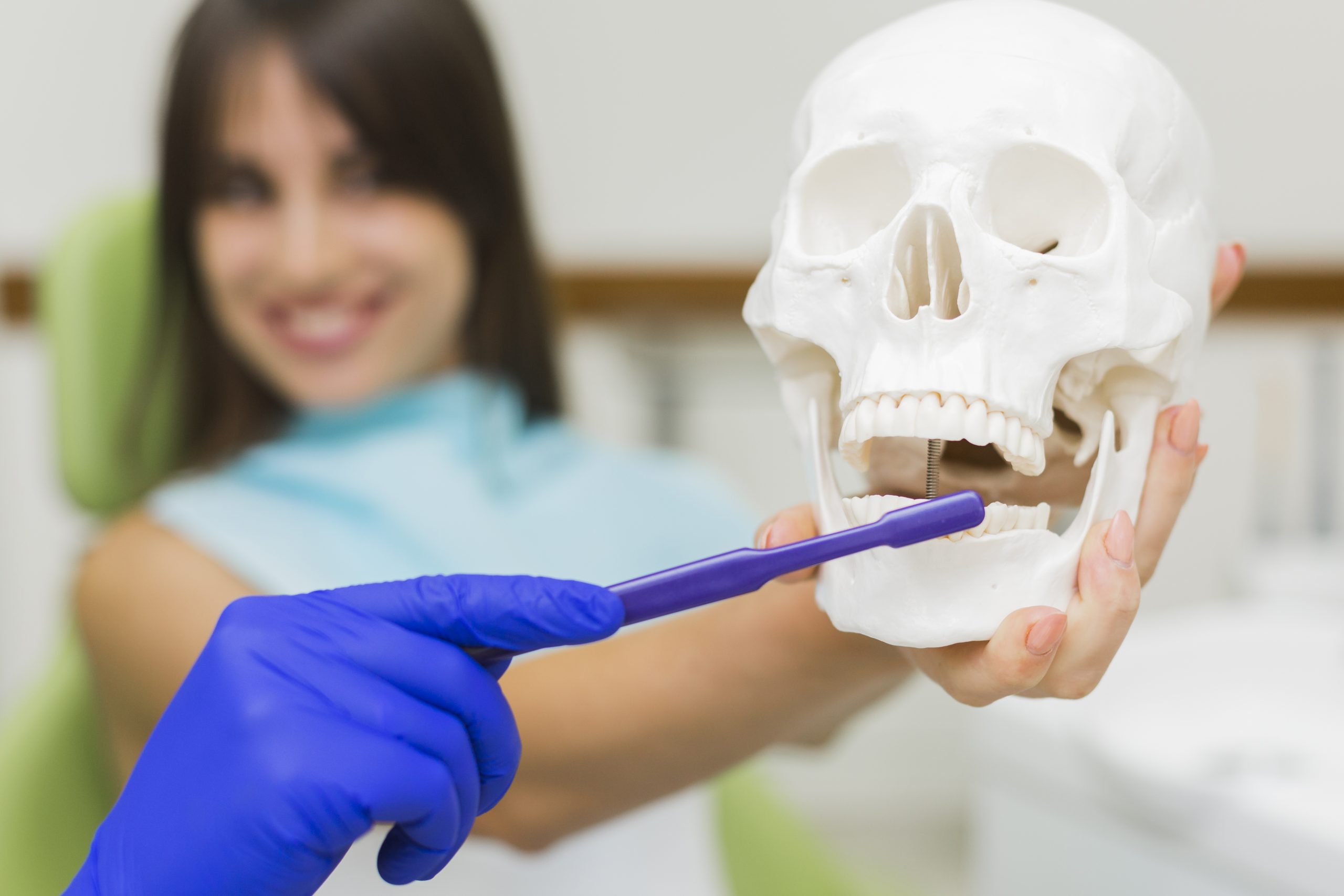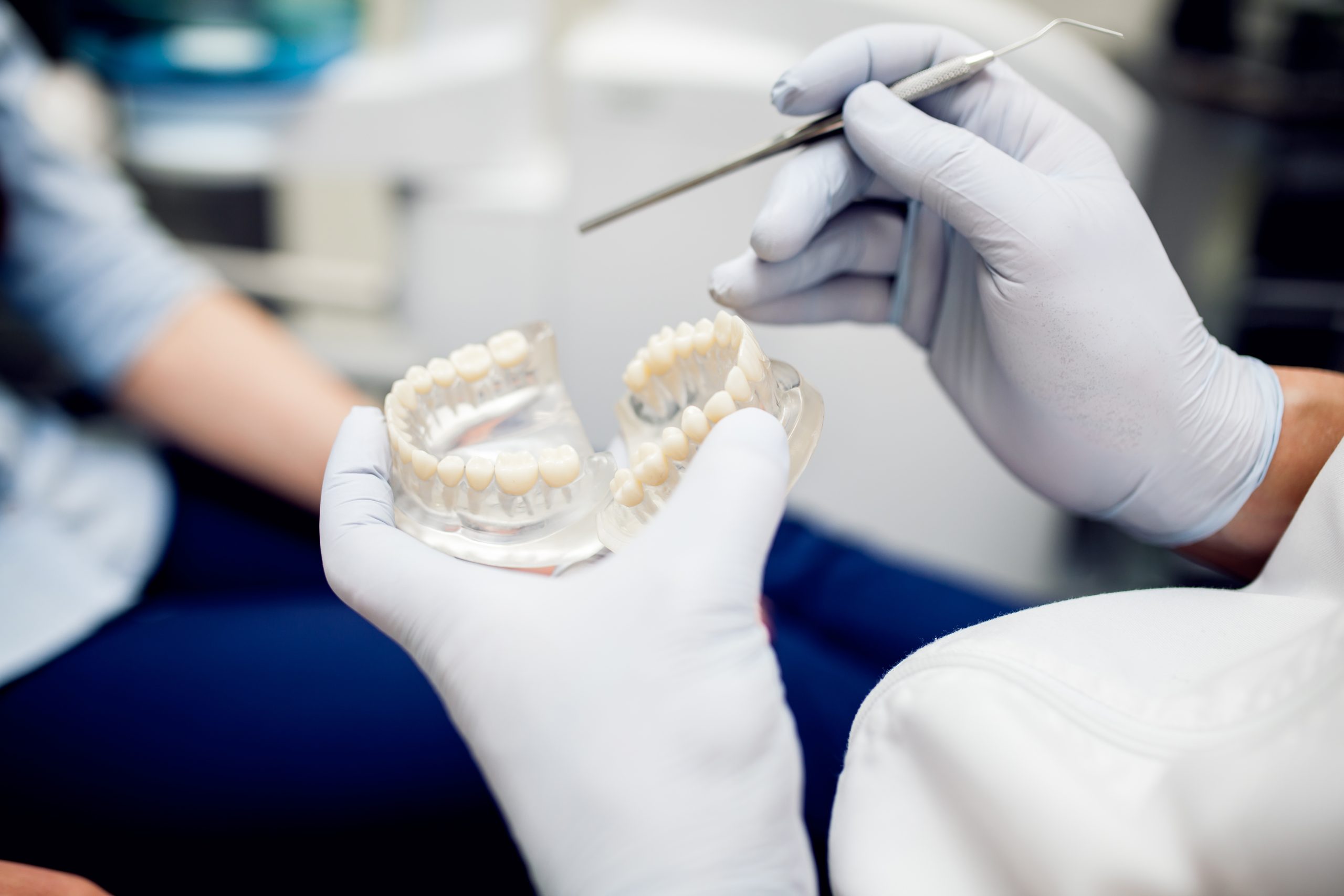If you’ve recently received new dentures, you might be experiencing a mix of relief and uncertainty. Whilst dentures can help improve your ability to eat and speak, the first few weeks often bring small challenges as your mouth adjusts to this change. You’re not alone in this experience; many new denture wearers find that speech feels different or eating requires more thought at first.
Learning to adapt to dentures takes time and patience. Your mouth needs to become accustomed to the feel of dental prosthetics, and your muscles need to learn new patterns for speaking and chewing. The good news is that these early difficulties are normal and temporary. With consistent daily wear and regular guidance from your dentist, many people find the adjustment becomes easier over time. The adjustment period varies from person to person.
This guide walks you through practical steps for adapting to life with dentures. We’ll cover what to expect during the adjustment period, how to improve your speech, ways to make eating easier, and when to seek professional advice. You don’t need to navigate this transition alone; your dental team is here to support you at every stage.
- Adapting to dentures involves an initial adjustment period. During this time, your mouth becomes accustomed to the feel of dental prosthetics, and your muscles learn new patterns for speaking and chewing.
- Common early experiences include excessive salivation, minor soreness, and speech changes that often improve with consistent wear as your mouth adjusts.
- Speech clarity can improve through regular practice such as reading aloud, speaking slowly, and strengthening muscle coordination while your mouth adjusts to the dentures.
- Eating may become easier when you start with soft foods like mashed potatoes and cooked vegetables, then gradually introduce firmer textures as your gums and jaw adapt.
- Social interactions may feel more natural over time as you gain experience speaking and eating in various settings with your new dentures.
- Regular dental check-ups allow your dentist to make necessary adjustments and address any persistent discomfort or fitting issues during your adaptation process.
Understanding the Adjustment Period with New Dentures
Starting to wear dentures marks the beginning of an adaptation process that unfolds over several weeks. Your mouth is learning to accommodate a foreign object, and your facial muscles are developing new coordination patterns. Understanding what typically occurs during this time can help you set realistic expectations and recognise which experiences are normal parts of healing.
The adjustment period varies from person to person. Some people adjust quickly, whilst others need more time. Factors affecting your experience include how long you’ve been without natural teeth, the fit of your dentures, and how consistently you wear them. Most importantly, remember that adaptation is a gradual process. You won’t wake up one morning feeling completely accustomed to your dentures, but many people notice gradual improvement over time.
What to Expect in the First Few Weeks of Wearing Dentures
During the first few weeks, several physical changes and sensations are common as your body adapts to wearing dentures. Understanding these experiences can help you recognise what’s normal and what may need attention from your dentist:
- Increased saliva production:
Your mouth produces more saliva than usual during the initial days. This excessive salivation is your body’s natural response to something new in your mouth. Your salivary glands interpret the dentures as food and increase production accordingly. This often diminishes as your mouth adjusts to the presence of the dental prosthetics. - Speech difficulties:
You may notice that certain words feel harder to pronounce clearly. The tongue needs to learn where to position itself with dentures in place. Sounds like “s”,”’f”, and “th” often require the most practice. Your dentures may also feel bulky at first, particularly in the upper palate. This sensation often becomes less noticeable as you grow accustomed to the shape and presence of the dentures. - Gum soreness:
Minor soreness in your gums is common as they adapt to pressure from the dentures. These sore spots typically appear where the denture edges contact your gums. They may improve as your gums adjust and the dentures settle into place. However, persistent irritation should be reviewed by your dentist to address any fitting issues. - New muscle coordination:
The first few weeks also involve learning new muscle movements. Your lips, cheeks, and jaw work differently with dentures than they did with natural teeth. Chewing feels unfamiliar, and you may occasionally bite your cheek or tongue as your muscles adjust to the new sensations.
Practising Patience and Persistence
Adapting to dentures requires consistent daily wear. Some new denture wearers feel tempted to remove their dentures whenever discomfort arises, but this actually slows the adjustment process. Your mouth needs regular exposure to the dentures to become accustomed to them. Wear your dentures throughout the day, removing them only for cleaning and at night if your dentist recommends it.
Regular dental reviews are essential during the initial adjustment period. Your dentist can identify areas where the dentures may need minor adjustments to improve fit and stability. Even well-made dentures often require minor adjustments as your gums adapt to them. These check-ups can help address issues early and may reduce the likelihood of complications like persistent soreness.
Improving Speech with Dentures
Speaking clearly with new dentures presents one of the most common early challenges. The dentures change the shape and space inside your mouth, affecting how air flows and how your tongue positions itself to form sounds. Your brain needs to recalibrate the instructions it sends to your speech muscles. This recalibration happens through practice and repetition.
Understanding why speech changes can help you approach the issue practically. Dentures, particularly upper dentures, cover your palate where your tongue typically touches to create certain sounds. The tongue must learn new reference points. Additionally, the dentures themselves can click or move slightly when you speak, producing sounds you’re not used to. These issues often improve as your muscles gain strength and coordination.
Practice Makes Progress
Reading aloud helps your mouth and brain adapt more quickly. Choose a book, newspaper, or magazine and read for 10 to 15 minutes several times each day. Start by reading slowly and deliberately, focusing on accuracy rather than speed. As you become more comfortable, gradually increase your pace to a natural speaking rhythm.
Practising in front of a mirror helps you see how your lips and facial muscles move when speaking. Aim for normal, relaxed facial movements rather than overcompensating for the dentures. Recording yourself can also provide useful feedback; you can identify which sounds need more work and track your improvement over time.
Manage Slipping or Clicking Sounds
Clicking sounds often occur when dentures move slightly during speech. This movement typically happens because the muscles haven’t yet learned how to hold the dentures stable whilst forming words. As your muscles strengthen and your coordination improves, the clicking may diminish.
Proper denture fit affects stability significantly. Dentures that sit well on your gums are less likely to shift during speaking or eating. If clicking or movement persists beyond the first few weeks, contact your dentist for an assessment. They can make minor adjustments to improve how the dentures rest on your gums, which often addresses stability issues. These adjustments are a normal part of the adaptation process and can improve how your dentures function.
Eating and Enjoying Meals Again
Learning to eat with dentures requires patience and a gradual approach. Chewing with dentures differs significantly from chewing with natural teeth. Natural teeth have roots that provide sensory feedback about pressure and texture. Dentures sit on your gums, so you rely more on visual cues and the feel of food against your palate and tongue.
The key to adapting well is to start slowly and gradually build up to more challenging foods. Don’t expect to eat everything you used to enjoy immediately. Your gums need time to adjust to the pressure of chewing, and your jaw muscles need to learn new movement patterns that keep the dentures stable during meals.
Starting with Soft Foods
Starting with soft, easy-to-chew foods helps your mouth adapt gradually to eating with dentures. This approach can help you build experience whilst potentially reducing discomfort during the initial adjustment period. Here are practical steps to guide your food choices:
- Begin with soft, nutritious foods:
Start with mashed potatoes, cooked vegetables, scrambled eggs, yoghurt, and soups. These foods provide good nutrition without putting much strain on your gums or jaw. They allow you to practise eating motions without risking discomfort or denture instability. - Cut food into smaller pieces:
Smaller pieces are easier to manage and reduce the risk of biting down too hard on something unexpectedly firm. This precaution helps you avoid sore spots on your gums and prevents the dentures from shifting suddenly. - Gradually introduce firmer textures:
As you become more comfortable, move from mashed potatoes to soft-cooked vegetables, then to firmer vegetables. Add tender fish before trying tougher meats. This progressive approach lets your mouth adapt steadily without overwhelming your gums or muscles. - Avoid hard and sticky foods initially:
During the first few weeks, avoid hard and sticky foods like caramel or toffee, which can pull on your dentures. Hard foods like raw carrots, tough steak, or crusty bread require a strong biting force that your gums may not yet be ready to handle. Reserve these foods for when you’ve become more accustomed to chewing with dentures. - Develop strategies for challenging foods:
Some foods may always require extra care when wearing dentures. Corn on the cob, whole apples, and tough meat can remain challenging even after you’ve adjusted. Many people manage these foods by cutting corn off the cob or slicing apples before eating them.
Chewing Evenly on Both Sides
Proper chewing technique helps maintain denture stability and prevents discomfort during meals. Learning to distribute pressure evenly across both sides of your mouth is essential for adapting to dentures. Here are key practices to develop effective chewing habits:
- Chew on both sides simultaneously:
Place small pieces of food on both sides of your mouth at the same time, then use both sides to chew together in a steady rhythm. This can help keep your dentures balanced and stable. When you chew only on one side, the dentures can tip or shift, creating discomfort and making it harder to break down food effectively. Even pressure distribution may also help reduce excessive soreness on one side. - Chew slowly and deliberately:
Take your time during meals, especially during the adjustment period. Rushing increases the risk of biting your cheek or tongue and makes it harder to maintain denture stability. A slower pace also allows you to taste your food properly and recognise when something feels too hard or requires more chewing. - Sip beverages during meals:
Water or other beverages help moisten food and make chewing easier. Adequate moisture can help food particles move more smoothly in your mouth and may reduce the likelihood of them becoming trapped under your dentures. This is particularly helpful when eating drier foods like bread or crackers. - Rinse when needed:
If you notice food particles becoming trapped under your dentures during meals, rinse your mouth with warm water. Trapped food can cause discomfort and irritate your gums if left in place.
Adapting to Social Situations with Dentures
Social interactions during the early weeks of wearing dentures can feel daunting. You might worry about how you sound when you speak, whether your dentures are noticeable, or whether food will get stuck during a meal out. These concerns are normal and shared by many new denture wearers. Many people find that others don’t notice they’re adjusting to dentures.
As you become more accustomed to speaking and eating with dentures, social settings may become easier to manage. The muscle coordination that felt so deliberate at first becomes automatic. The self-consciousness that made you monitor every word you spoke fades as you realise you’re communicating effectively. This transition happens gradually through repeated positive experiences in various social contexts.
Becoming Comfortable in Social Settings
Adapting to dentures in social settings is a common experience that improves naturally with time and practice. Many new denture wearers feel self-conscious at first, but these feelings typically diminish as you gain experience speaking and eating in various situations. Your mouth becomes more accustomed to the dentures with each social interaction, and the movements that felt deliberate at first become automatic. Many people find that over time, they can participate in conversations and meals without constantly thinking about their dentures. The timeframe for this varies from person to person.
Essential Tips for Speaking and Smiling with Dentures
Maintaining relaxed facial movements helps you speak and smile more naturally with dentures. Tension in your face can make dentures feel more noticeable and can affect how you pronounce words. Consciously relaxing your jaw and facial muscles before speaking or smiling may help both activities feel easier and more natural.
Engage in regular conversations with different people to build experience speaking in various contexts. Talk to shop assistants, neighbours, colleagues, or friends. Each conversation provides practice and can help reinforce the muscle patterns your brain is developing for speaking with dentures. When you speak, focus on breathing naturally and maintaining good posture, as proper posture helps air flow smoothly for clear speech.
Practise smiling in front of a mirror to see how your smile looks with dentures. Many people discover that their smile appears quite natural. Understanding how your smile looks may help you feel more at ease in social situations.
When to Seek Professional Advice
Whilst adapting to dentures involves some expected discomfort and challenge, certain symptoms indicate you should contact your dentist. Understanding the difference between normal adjustment difficulties and issues requiring attention helps you get help when you need it. This knowledge also helps you avoid unnecessary worry over temporary experiences that will improve with time.
Your dentist expects to see you for follow-up appointments during the adjustment period. These visits are part of the standard process, not an indication that something is wrong. Regular check-ups allow your dentist to assess how your gums are adapting and make any necessary adjustments that may improve your denture experience.
Check-Ups and Adjustments
Schedule follow-up appointments as your dentist recommends, typically at two weeks, one month, and three months after receiving new dentures. These check-ups allow your dentist to examine your gums for any irritation, assess how the dentures fit as your gums change shape, and make small adjustments that improve stability and comfort.
During these appointments, tell your dentist about any areas of discomfort, even if they seem minor. Your dentist may adjust the denture surface in areas where it’s creating pressure points or modify the shape slightly to improve fit. These adjustments are normal, as your gums and bone continue to change shape for several months after tooth loss, which may require ongoing fine-tuning of the denture fit.
Regular dental visits remain essential even after you’ve fully adjusted to your dentures. Ongoing check-ups allow your dentist to monitor your oral health and assess whether your dentures continue to fit properly.
Persistent Discomfort or Sores
Contact your dentist if soreness in one area persists beyond the first week, particularly if it’s preventing you from wearing your dentures. Whilst minor tenderness is normal during early adjustment, ongoing pain in a specific spot suggests the denture is creating excessive pressure that needs attention. Loose dentures that move significantly when you eat or speak also need evaluation, as they may require adjustment to improve stability.
Don’t attempt to adjust your dentures yourself by filing or cutting them. This can damage the dentures and create sharp edges that irritate your gums. Always let your dentist make any modifications, as they have the training and knowledge to adjust dentures properly and help protect your gums from further irritation.
Final Thoughts
Learning to adapt to dentures takes time, but steady progress happens when you wear them consistently and seek professional guidance as needed. The challenges you face during the first few weeks often become less noticeable as your muscles strengthen and your mouth becomes accustomed to the feel of dental prosthetics. Be patient with yourself and focus on the improvements you notice in your own experience from week to week.
If you’re experiencing difficulties adapting to your dentures or have questions about the adjustment process, our team at Karrinyup Dental Centre can help. We can assess your denture fit, make any necessary adjustments, and provide guidance that may support your adaptation. Contact us to arrange a review appointment or to discuss any concerns you may have about your dentures.





